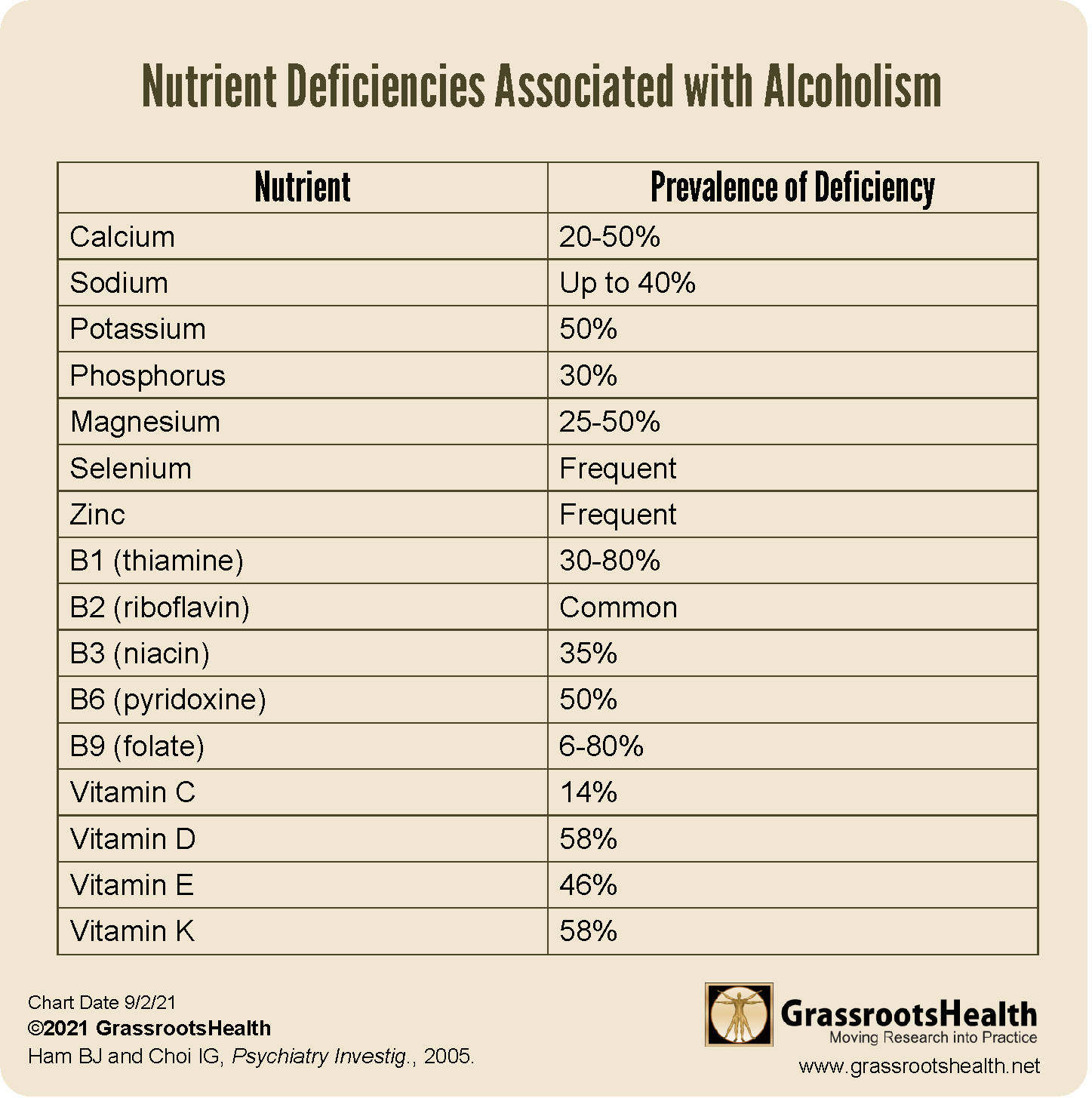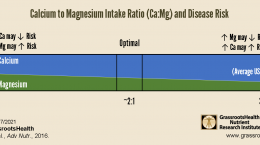Published on September 6, 2021
Alcohol intake can present an issue for several nutrients, with magnesium, vitamin D and certain B vitamins among those affected
 Last week, we covered a list of medications that have a potential affect on vitamin D levels, and received a common question in return from several of our followers – what about alcohol?
Last week, we covered a list of medications that have a potential affect on vitamin D levels, and received a common question in return from several of our followers – what about alcohol?
According to an analysis of the GrassrootsHealth cohort that was completed in September of 2019, 72% of participants had indicated consumption of alcohol in the months prior to their last test. Since then, alcohol consumption has risen due to the COVID-19 pandemic; one study on adults in the United States indicating a large increase in alcohol intake, with 1/3 of their participants having reported binge drinking and 7% reporting extreme binge drinking over the study period.
How Much is Too Much Alcohol?
According to the Mayo Clinic, there are pros and cons to light or moderate alcohol intake, however, too much alcohol is harmful in many ways.
Heavy alcohol use is defined as
- more than 4 drinks on any day or more than 14 drinks per week for men
- more than 3 drinks on any day or more than 7 drinks per week for women
- binge drinking (5 or more drinks for men or 4 or more drinks for women within 2 hours) on 5 or more days in the past month
- alcoholism, defined as uncontrolled continued or compulsive use of alcohol
Keep in mind that many of the nutrient imbalances discussed below are in the context of chronic excessive alcohol intake, and may not occur with minimal or moderate drinking.
Nutrients Affected by Heavy and Chronic Alcohol Intake
A paper by Ham BJ and Choi IG reviews the effects of alcohol on specific nutrients and the association between alcohol intake and nutrient status; their findings on the effects of alcoholism on the status of certain nutrients are summarized in the table below.
According to the authors, alcoholism is the most common cause of magnesium imbalance. One study showed that alcohol intake per day was negatively associated with both serum magnesium and serum selenium levels. In fact, the higher the intake of alcohol, the lower the magnesium and selenium levels, indicating that no matter how much alcohol is consumed, any amount may affect the status of these two essential elements.
Chronic alcohol intake is also associated with low levels of zinc, especially among women; however, this may be directly related to the health of the liver.
Folate is one of the most negatively affected nutrients due to alcohol intake. When alcohol is present in the body, the liver ‘leaks’ folate into the blood, which is then excreted by the kidneys. The intestines, which are meant to reabsorb folate, are not able to due to damage from alcohol toxicity.
Deficiency of other B vitamins (such as thiamin, riboflavin, and pyridoxine) are also common in chronic alcoholics, as is vitamin C deficiency.
Deficiencies of fat soluble vitamins A, D, and E were also reported as more likely being deficient among alcoholics compared to non-alcoholics, especially among those with liver and/or pancreatic disease. One study in particular found that 58% of heavy alcohol drinkers had deficient levels of vitamin D (below 20 ng/ml or 50 nmol/L).
What Causes Nutrient Deficiencies in Alcoholics and Heavy Drinkers?
There are several ways that alcohol intake, especially chronic alcohol intake, can lead to nutritional deficiencies or impair the use of nutrients in the body. These include
- inhibited absorption of specific nutrients (such as thiamine and folate) in the presence of alcohol in the gut
- reduced uptake and impaired utilization of nutrients due to damage of the gut, liver, and pancreas
- impairment of nutrient co-enzyme function needed for metabolism
- excessive renal loss of certain nutrients, especially magnesium, potassium, calcium, zinc, and some B vitamins
- inadequate nutrient intake due to substituting alcohol for food – often leading to malnutrition
- impaired or over-burdened liver function, which can prevent certain vitamins from being metabolized properly (including vitamins A and D)
- decreased storage capacity of certain nutrients in the liver (such as B vitamins and vitamin A)
- higher demand and use of certain nutrients due to tissue damage caused by alcohol
Are Your Vitamin D and Essential Mineral Levels OK?
 Having and maintaining healthy vitamin D levels and other nutrient levels can help improve your health now and for your future. Choose which to measure, such as your vitamin D and essential minerals including magnesium, selenium, and zinc, by creating your custom home test kit today. Take steps to improve the status of each of these measurements to benefit your overall health. You can also track your own intakes, symptoms and results to see what works best for YOU.
Having and maintaining healthy vitamin D levels and other nutrient levels can help improve your health now and for your future. Choose which to measure, such as your vitamin D and essential minerals including magnesium, selenium, and zinc, by creating your custom home test kit today. Take steps to improve the status of each of these measurements to benefit your overall health. You can also track your own intakes, symptoms and results to see what works best for YOU.
Enroll and test your levels today, learn what steps to take to improve your status of vitamin D (see below) and other nutrients and blood markers, and take action! By enrolling in the GrassrootsHealth projects, you are not only contributing valuable information to everyone, you are also gaining knowledge about how you could improve your own health through measuring and tracking your nutrient status, and educating yourself on how to improve it.
Help everyone Move Research into Practice with vitamin D and other nutrients! As a special birthday gift to everyone, in honor of the science, we have created a special scholarship fund for anyone to donate to that will go towards helping others participate. Your donation will allow anyone to get help with funding their participation when they need it.
Text-to-give: Text Daction to 44321 to add to our Scholarship Fund.






